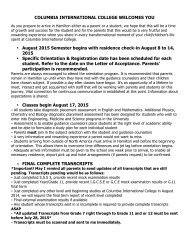french
You also want an ePaper? Increase the reach of your titles
YUMPU automatically turns print PDFs into web optimized ePapers that Google loves.
In everyday language, “on” is used, instead of “nous”, to express “we”; the verb is always used in the 3rd<br />
person singular. For example, to say "We (are) meeting at 7 o'clock", you could say either “On se rencontre<br />
au cinéma à sept heures.” (colloquial) or “Nous nous rencontrons au cinéma à sept heures.” (formal) (there<br />
are two words "nous"). For more, see the Wikipedia entry.<br />
G: Introduction to Verbs<br />
A verb is a word that describes an action or mental or physical state.<br />
Tenses and Moods<br />
French verbs can be formed in four moods, each of which express a unique feeling. Each mood has a<br />
varying number of tenses, which indicate the time when an action takes place. The conjugations in the<br />
present tense of the indicative mood, the present indicative, is discussed in the next section. There is one<br />
conjugation for each of the six subject pronouns.<br />
Infinitives<br />
The infinitive form is the basic form of a verb. It does not refer to a particular tense, person or subject. In<br />
this book, the infinitive form of the verb is used to identify it. In English, the infinitive form is to ___. In<br />
French, the infinitive is one word. For example, parler translates to to speak, finir translates to to finish, and<br />
aller translates to to go.<br />
Conjugation<br />
French verbs conjugate, which means they take different shapes depending on the subject. English verbs<br />
only have one conjugation; that is the third person singular (I see, you see, he/she sees, we see, they see).<br />
The only exception is the verb "to be" (I am; (thou art); you are; he/she is; we are; they are;). Most French<br />
verbs will conjugate into many different forms. Most verbs are regular, which means that they conjugate in<br />
the same way. The most common verbs, however, are irregular.<br />
G: Être - To Be<br />
Être translates as to be in English. As in most languages, it is an irregular verb, and is not conjugated like<br />
any other verb.<br />
Formation<br />
French Verb • Print version • audio (info •103 kb • help)<br />
être to be<br />
Singular<br />
Plural<br />
first person je suis jeuh swee I am nous sommes noo sum we are<br />
second person tu es too ay you are vous êtes voozett you are<br />
third person<br />
il est eel ay<br />
elle est ell ay<br />
he is<br />
she is<br />
ils sont<br />
eelsohn<br />
they are<br />
(masc. or mixed)<br />
on est ohn ay one is elles sont ellsohn they are (fem.)<br />
Examples




